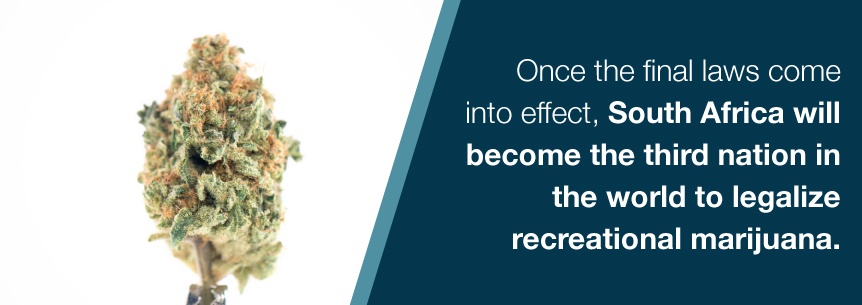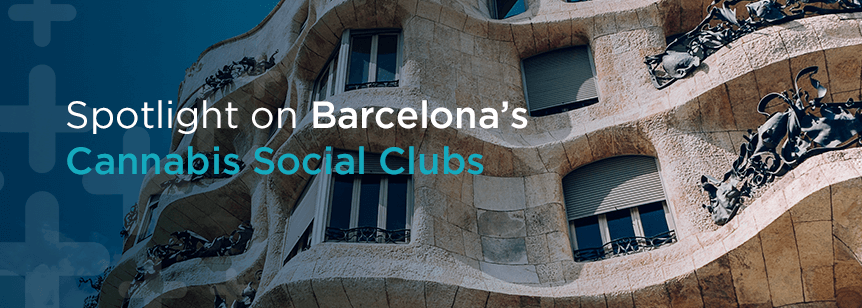On September 18, South Africa’s Constitutional Court ruled the illegality of certain marijuana-related activities unconstitutional. Adults may now use or grow marijuana in private. This exciting development offers patients hope of greater access to care and legitimizes marijuana.
Why Did the Constitutional Court Make This Ruling?
South Africa not only legalized private marijuana, but they also established it as a constitutional right. Multiple parties took to the court to pursue a case against South African cannabis laws. They included three marijuana users who received punishment who argued that their prosecution intruded into their private lives. The initial hearing happened at Cape Town’s High Court.
They ruled the marijuana-related aspects of three laws unconstitutional as a result:
- Drugs Act, Section 4 (b): Prohibited the use and possession of marijuana
- Drugs Act, Section 5 (b): Prohibited growing cannabis plants
- Medicines Act, Section 22A(9)(a)(i): Made using, growing or owning cannabis marijuana in private a criminal offense
To decide on a ruling, the High Court examined the right to privacy as outlined in the South African Constitution. The case’s co-applicants contended that laws that banned private marijuana activities infringed on multiple Constitutional rights, including the right to equality. However, the High Court focused on the right to privacy only. It seems that investigating the right to privacy alone gave sufficient evidence to prove these laws’ unconstitutional nature.
After making their ruling in March 2017, the High Court passed it on to the Constitutional Court. The High Court’s original ruling stated that adults should have the right to use, buy or grow marijuana in a private dwelling. When the Constitutional Court reviewed the ruling, they went one step further — they unanimously ruled that adults should have these rights in privates spaces as a whole, not just dwellings. While the High Court mentioned marijuana sales in their ruling, the Constitutional Court refused to decriminalize them.
Temporary Suspension of Restrictions
Since the Constitutional Court just made this ruling, South Africa doesn’t have any new rules that legalize private marijuana activities so far. However, adults may still use, possess and grow cannabis in private because the Court invalidated the previous regulations. They consider these unconstitutional laws invalid for the next 24 months. During those 24 months, Parliament will finalize the details of the new cannabis rules. Parliament will establish a possession limit for private use and create legal definitions.
What You Can and Can’t Do Under the New Laws
South Africa legalized private marijuana activities, but only to a certain extent. Some actions are legal, while others are not. We don’t know how much the official regulations will restrict what adults can and can’t do with marijuana. So far, adults will have the right to use, grow and own marijuana in private. But, when you read a law, you need definitions of important terms, so you know how officials will enforce it.
We need explanations for the following terms:
- In Private: The Constitutional Court’s ruling expands legal private use to anywhere in private. But, what do they consider “in private?” How far outside the home can someone use, own or grow marijuana?
- Use: Will the final regulations allow only specific methods of marijuana use? Can someone use cannabis in ways other than smoking?
- Marijuana: What counts as legal marijuana for private use? Can adults only grow and use certain strains? Do edibles and concentrates count as marijuana?
- Adult: At what age does someone become an adult for the purpose of private marijuana use?
We will find out what the law has in store within the next 24 months. In the meantime, take care when you use marijuana.
Implications for Medical Marijuana Patients in South Africa
In 2017, the Medicines Control Council issued guidelines for a potential medical cannabis program. Under regulations considered by Parliament, patients with epilepsy or chronic pain caused by select conditions would qualify. However, legalized private marijuana will still benefit patients across the country by:
- Helping Patients Who Don’t Have an Approved Condition: Patients with spasticity and other conditions that respond to cannabis can medicate legally.
- Increasing Access for Patients in Remote or Conservative Areas: While doctors don’t need a special certification to issue a medicinal cannabis prescription, not every physician will agree to write one. Patients without a cooperative doctor nearby don’t have to worry about a prescription.
- Allowing Home Cultivation: Under the Medicines Control Council guidelines, only licensed professionals could grow cannabis. Patients can now raise their own plants.
These benefits have one caveat — getting marijuana. Since the Constitutional Court kept laws in place that ban sales, we don’t know how adults can legally obtain cannabis. Hopefully, this will become clear in the finalized rules.
What Does This Update Mean for Marijuana in the United States and the World?
Once the final laws come into effect, South Africa will become the third nation in the world to legalize recreational marijuana. Many countries have decriminalization or medical marijuana, but only Uruguay and Canada allow recreational use. Uruguay became the first nation with recreational cannabis in 2013, and Canada followed five years later.

The Constitutional Court’s ruling comes shortly after Canada legalized recreational marijuana. In June 2018, the Canadian Senate passed the Cannabis Act, just three months before the events in South Africa. Canada’s developments could have a large amount of influence over decision making in the United States. However, we don’t know if we can say the same about South Africa. While Canada is a significant world nation, South Africa has declining global power. Large countries like the United States ignored Uruguay’s legalization, so we may see the same things happening with South Africa.
However, the Constitutional Court’s ruling could still push us one step further, if only a tiny step. In the full judgment, Deputy Chief Justice Raymond Zondo cited decisions from states across the U.S. that legalized recreational marijuana. Perhaps citing Zondo’s ruling will turn the tides in a future hearing for recreational legalization in America.






